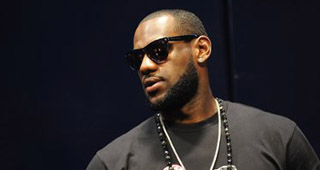Now you got the power to do anything you want to /
Until you ask yourself, “Is this what it’s all come to?” /
Lookin’ at life through sunglasses and a sunroof /
But do you have the power to get out from up under you? /
F*** rollies, labels, f*** what everybody wants from you /
They trying to Axl Rose you, welcome to the jungle.
-- Jay-Z, (Power) Remix
Ever since “The Decision”, interest in the Miami Heat has transcended basketball. When LeBron “took his talents to South Beach” on ESPN, he became an international celebrity, someone more famous than the sport itself.
For many fans, he epitomized everything wrong in popular culture, a self-centered and spoiled athlete who abandoned his home-town to take “the easy way out”.
By going to Miami, he was betraying the narrative of the NBA superstar in the post Michael Jordan era. Rather than besting Dwyane Wade in the same way that Jordan defeated Clyde Drexler, LeBron joined Wade’s team. It was something Jordan never would have done.
Yet, as Jay-Z is essentially saying in his verse, so what?
Is real “power” being the world’s best rapper or its greatest basketball player? What’s the point if you don’t have control over your own life? If you don’t have the freedom to “get out from up under you / f*** rollies, labels, f*** what everybody wants from you”?
Growing up, Jay-Z watched the first generation of rappers get exploited by the music industry, leaving the game with as little money as they came in with. So when he had “the power”, he was determined not to waste it. He didn’t want to just be the rapper; he wanted to be the CEO too.
He knew record labels and agents would throw money, cars and girls at him in an attempt to buy him off. The powers that be would rather give an entertainer more money than give him ownership.
Similarly, to leave Cleveland, LeBron had to be willing to take $30 million less over the life of his contract. The entire NBA economic system is built around exploiting the value of its top players: in a free market for his talents, LeBron would make around $50 million annually.
Owning an NBA team with a Hall of Fame player in the prime of his career is nearly a license to print money. The current ownership group of the Spurs, fronted by local businessman Peter Holt, bought the franchise for $75 million in 1993, four years before Tim Duncan landed in their laps. The Spurs are now worth $404 million. That’s a pretty healthy return on their investment.
Why should LeBron let Dan Gilbert, a man who made his fortune selling exploding mortgages to elderly Ohio home-owners, make another fortune off his talents? Why couldn’t LeBron make one for himself?
Because the NBA artificially caps the salaries of its best players, increasing their Q rating is the only way they can earn their market value, which means playing for a big market team on either coast or in Chicago.
But the last thing small-market owners want is players having “the power” to choose where they can live and work, as Gilbert’s emotion-fueled letter to David Stern about the Lakers acquiring Chris Paul made clear. The value of the Cavaliers franchise plummeted from $476 million to $355 million after “The Decision”, $20 million less than what Gilbert paid for it in 2005.
A 25-year-old without a college degree put him underwater on the biggest investment of his life. And in a meeting to convince LeBron to stay, a business meeting with hundreds of millions of dollars on the line, he showed LeBron cartoons. It’s not the way you treat a business partner you respect.
Owners like Gilbert don’t want players like Kyrie Irving having the same power, which is why they pushed Stern to take such a hard-line during the lockout. Control was at the center of the work stoppage, as they were willing to hold the taxpayers who fund their stadiums hostage to push for a hard-cap system that would make it impossible to assemble teams like the Heat and the New York Knicks in the future. They didn’t succeed, but they were able to squeeze billions of dollars out of the players in the process.
Now, as a new season finally begins, LeBron and the Heat are playing for something bigger than themselves. Throughout the history of professional sports, owners have fought tooth and nail against free agency. Miami did not build a championship team; they offered a blank slate to three All-NBA players. A Heat title would show that ownership is, at best, a necessary evil.
Can a team assembled by three guys over a few Olympic practices really defeat 29 other teams meticulously assembled by hundred-million dollar organizations over the span of years? If LeBron James Jr. and Bryce James are blessed with the size and talent of their father, will they have the same freedom to choose where they want to work? Or, to paraphrase Abraham Lincoln, will “a team of the players, by the players and for the players perish from the Earth”?
Can three twenty-something employees really thumb their noses at an entire industry and get away with it? Will LeBron, Wade and Bosh be able to occupy the NBA?
It’s time to find out.

Jonathan Tjarks wrote on the NBA for RealGM from 2011-2016 before joining The Ringer.
Follow @JonathanTjarks on Twitter.


